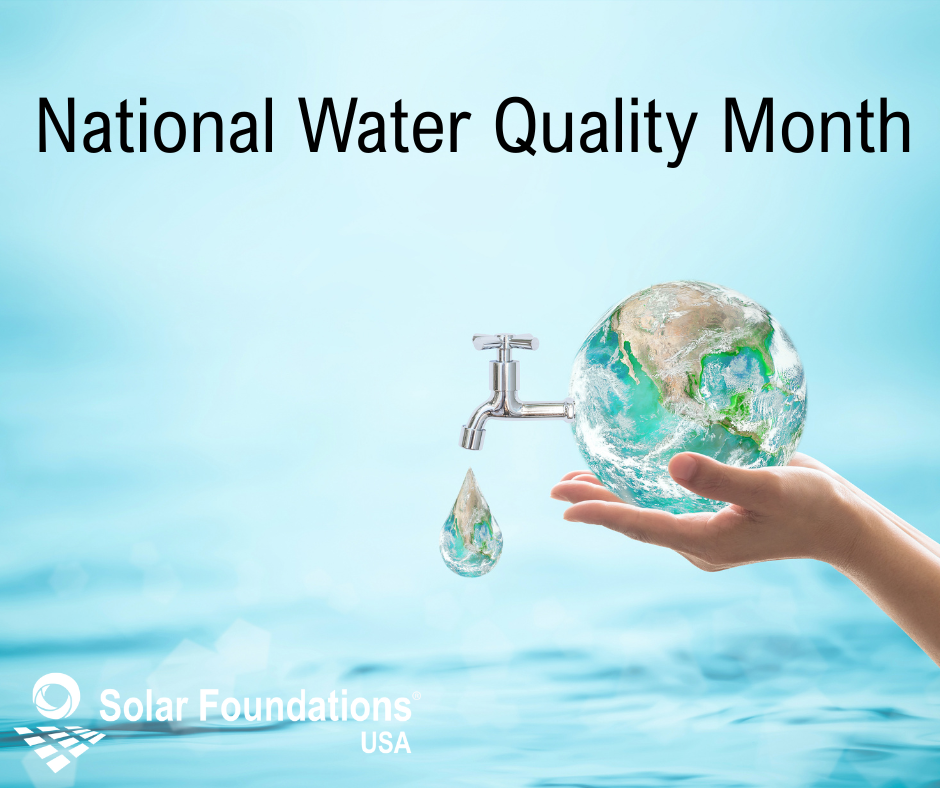
News & Blog
National Water Quality Month: A Guide to Cleaner Water at Home and in Our Communities

National Water Quality Month: A Guide to Cleaner Water at Home and in Our Communities
Every August, we observe National Water Quality Month to raise awareness about the importance of clean, safe water—for drinking, cooking, farming, recreation, and protecting ecosystems. While large-scale infrastructure and policy play a role, water quality starts at home—with the choices we make every day.
At Solar Foundations USA, we believe responsible land use includes preserving water resources. That’s why we support low-impact installation practices and sustainable development. But environmental protection doesn’t stop at the job site. In this guide, we’re sharing simple, practical steps you can take at home to help protect water quality in your own community.
💧 Why Water Quality Matters
Water touches every part of our lives. When it’s contaminated—by chemicals, waste, or runoff—it poses serious risks to public health, wildlife, and local ecosystems. Clean water is not just a luxury—it’s a necessity. National Water Quality Month is a reminder that small, individual actions can collectively have a big impact.
🏠 8 Ways to Protect Water Quality at Home
Here’s how you can contribute to cleaner water, starting in your own household:
1. Fix Leaks Promptly
Dripping faucets and running toilets may seem minor, but they waste thousands of gallons of water each year. Beyond water conservation, fixing leaks reduces the chance of mold or water damage that could eventually affect groundwater.
2. Use Eco-Friendly Lawn Care Products
Many fertilizers and pesticides contain chemicals that wash into storm drains and local waterways when it rains. Choose organic or low-phosphorus options, or better yet—consider using compost and mulch to nourish your lawn naturally.
3. Limit Paved Surfaces
Driveways and walkways made from impermeable materials increase runoff. If you're planning a home improvement project, consider using permeable pavers or gravel to allow rainwater to soak into the ground, reducing the load on stormwater systems.
4. Properly Dispose of Chemicals
Never pour paint, motor oil, or household cleaners down the drain or into the street. These substances can end up in streams, rivers, and drinking water sources. Look for local hazardous waste disposal programs instead.
5. Install a Rain Barrel
Collecting rainwater from your roof is a great way to reduce runoff and use water more sustainably. That water can be used to irrigate gardens or lawns without drawing from the municipal supply.
6. Pump Your Septic System Regularly
If you have a septic system, regular maintenance (every 3–5 years) helps prevent leaks and groundwater contamination. An overloaded or failing system can be a serious health hazard.
7. Don’t Flush Wipes or Medications
Even "flushable" wipes don’t break down easily and can clog pipes or damage wastewater treatment systems. Likewise, flushing medications introduces harmful substances into the water supply. Drop them off at a designated disposal site instead.
8. Reduce Single-Use Plastic
Plastic waste often finds its way into waterways, where it breaks down into harmful microplastics. Choose reusable water bottles, bags, and containers to reduce your plastic footprint.
🌎 Every Action Adds Up
Water quality isn’t someone else’s responsibility—it’s everyone’s. Whether you're upgrading your landscape, rethinking your cleaning products, or simply fixing a leaky faucet, your choices help protect a resource we all depend on.
At Solar Foundations USA, we’re committed to responsible construction practices that minimize soil disruption and runoff, and we encourage our partners and customers to join us in being good stewards of the environment.
Celebrate National Water Quality Month with simple tips to protect clean water at home. Learn how your daily choices can help preserve our most vital resource.




